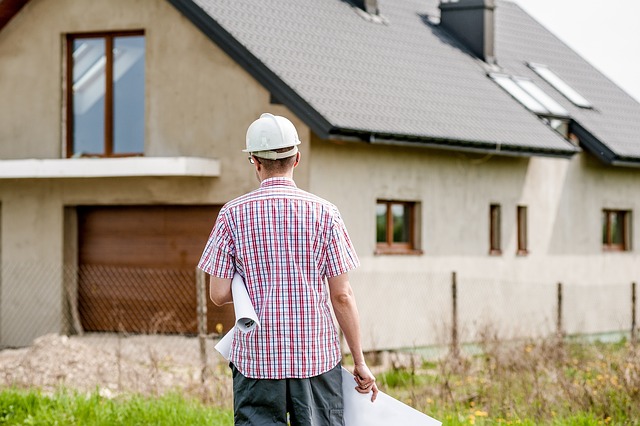Effective home repair and maintenance require a solid understanding of both plumbing and electrical systems. Professionals must be adept at managing water flow, pressure adjustment, and pipework, as well as adhering to local water conservation regulations. Electrically, they need to be well-versed in the National Electrical Code (NEC) and understand circuitry workings and troubleshooting methods to ensure safety standards are met during electrical component installations or maintenance. Safety is a top priority, with professionals responsible for identifying and rectifying potential hazards to prevent fires or malfunctions. Homeowners attempting DIY repairs should seek training for basic skills but recognize the necessity of hiring licensed plumbers and electricians for complex issues. Regular maintenance can prevent minor problems from becoming major ones. For electrical systems, simple tasks like light fixture replacements are manageable for DIYers, but more intricate jobs like upgrading panels or diagnosing wiring issues should only be handled by certified professionals due to the significant risks involved. Regular inspections by these experts are crucial for safety and efficiency. Updating a home's electrical system with energy-efficient technologies not only enhances comfort but also reduces utility costs and can be integrated with smart home systems for added convenience and security. Home repair and maintenance, particularly in plumbing and electrical work, are vital for sustaining a safe, efficient, and modern living environment.
Navigating home repair and maintenance can be a complex task, especially when it comes to plumbing and electrical systems. To ensure your dwelling is safe, efficient, and in good working order, possessing the right knowledge and skills is paramount. This article serves as a comprehensive guide, offering insights into essential competencies for effective home upkeep, with a focus on both plumbing and electrical maintenance. From understanding the intricacies of home plumbing systems to illuminating the importance of electrical safety and efficiency upgrades, we’ll explore the key areas where homeowners can make a significant impact. Whether you’re tackling tasks yourself or recognizing when to call in an expert, this primer is your first step towards confidently managing your home’s maintenance needs.
- Essential Skills for Effective Home Repair and Maintenance: A Plumbing and Electrical Primer
- Navigating the Nuances of Home Plumbing Systems: When to DIY and When to Call an Expert
- Illuminating Your Home's Safety and Efficiency: The Role of Electrical Maintenance and Upgrades
Essential Skills for Effective Home Repair and Maintenance: A Plumbing and Electrical Primer

When it comes to maintaining and repairing a home, a combination of plumbing and electrical skills is indispensable for ensuring safety, efficiency, and longevity of your living space. For plumbing, understanding the fundamentals of water flow, pressure regulation, and pipework is crucial. Professionals in this field must be adept at diagnosing issues such as leaks, blockages, or water heater problems. They should also be familiar with installing fixtures, repairing pipes, and ensuring that all plumbing meets local codes and regulations for water conservation and safety.
In parallel, electrical expertise is equally vital, encompassing knowledge of electrical systems, circuitry, and troubleshooting for home repair and maintenance. Electrical professionals must possess a solid grasp of the National Electrical Code (NEC) or equivalent standards to ensure that all work is up to code. This includes installing and maintaining electrical panels, wiring, lighting fixtures, and electrical appliances. They should also be skilled in identifying potential hazards such as overloads, shorts, or faulty installations, and be capable of performing safe repairs to prevent electrical fires or system failures. Both plumbing and electrical skills require a commitment to ongoing education due to the ever-evolving technology and safety standards in the industry. Homeowners looking to undertake these tasks themselves should consider formal training or apprenticeships to develop these essential skills for effective home repair and maintenance.
Navigating the Nuances of Home Plumbing Systems: When to DIY and When to Call an Expert

Navigating the complexities of home plumbing systems requires a discerning approach, blending knowledge of home repair and maintenance with an understanding of when professional intervention is necessary. Amateur repairs can lead to costly mistakes, so it’s crucial to assess the situation accurately. Simple issues like fixing a leaky faucet or unclogging a minor blockage may be suitable for a DIY enthusiast with basic plumbing skills. However, more intricate problems such as repiping, major water leak detection and repair, or dealing with persistent sewer line blockages typically demand the expertise of licensed plumbers. These professionals are trained to handle the nuances of water pressure, pipe materials, and environmental factors that can affect a home’s plumbing system. Regular maintenance checks can often prevent minor issues from escalating, ensuring the longevity and efficiency of your plumbing infrastructure. Homeowners should familiarize themselves with the signs that indicate professional help is needed, such as recurring leaks, unusual noises from pipes, or a sudden drop in water pressure, to avoid complications that could have been avoided with timely expert assistance.
In the realm of home repair and maintenance, electrical systems present their own set of challenges. While some tasks like replacing light fixtures or installing ceiling fans might be within the scope of a confident DIYer, other electrical work, such as upgrading your electrical panel or troubleshooting complex wiring issues, should only be handled by certified electricians. Electrical systems are safety-critical components of any home, and any misstep can lead to hazardous situations, including electrical fires or system failures. It’s imperative to prioritize safety over cost when considering whether to tackle electrical repairs yourself or call an expert. Professional electricians not only ensure compliance with local codes but also provide the assurance that your home’s electrical system is functioning correctly and safely. Regular inspections by a qualified electrician can identify potential hazards, prevent outages, and prolong the life of your appliances and electronics.
Illuminating Your Home's Safety and Efficiency: The Role of Electrical Maintenance and Upgrades

Regular home repair and maintenance are integral to ensuring that your living space remains both safe and efficient, particularly when it comes to electrical systems. Electrical maintenance encompasses a range of activities from routine checks and minor repairs to comprehensive inspections by licensed professionals. These experts can identify potential hazards such as outdated wiring or overloaded circuits, which pose significant risks and can lead to fires or electrical failures. Upgrading your home’s electrical system not only enhances safety but also supports the integration of modern energy-efficient technologies, reducing your energy consumption and lowering utility bills. Advanced lighting solutions, such as LED bulbs, smart thermostats, and high-efficiency HVAC systems, can significantly improve both the comfort and efficiency of your home. Additionally, these upgrades are often compatible with smart home automation, allowing for remote control and enhanced security features. Home repair and maintenance are a continuous process that safeguards your family’s well-being and contributes to sustainable living practices. By staying proactive with electrical system evaluations and updates, homeowners can rest assured that their homes are not only functioning optimally but also safely, day in and day out.
Homeowners can significantly enhance their living spaces by staying informed about home repair and maintenance, particularly in plumbing and electrical systems. By understanding the essential skills needed for upkeep, homeowners can confidently address common issues or recognize when professional expertise is necessary. This comprehensive primer underscores the importance of regular inspection and timely intervention to ensure both safety and efficiency within the home. Whether tackling a plumbing problem or planning electrical upgrades, knowledge is power—empowering homeowners to maintain their homes effectively throughout the years.

